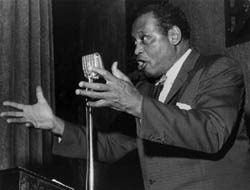
Film Festivals | Retrospective
Film Festival Celebrates Paul Robeson
Written by Gina Harris | Posted by: Anonymous
In May, a film series brought by film curator Hal Weaver was held at the African Meeting House of the Museum of Afro American History in Boston. Weaver, co-founder of CineFest Plus, has worked for decades to preserve the Robeson legacy.
The actor’s historically important films "Song of Freedom" (1936) and "Proud Valley" (1939) were presented. The first addressed his search for his African identity. Robeson retained the historic privilege of director’s cut. He is delightful as a London dockworker who is discovered by an opera impresario. A tour of Europe eventually leads him to Africa. "Proud Valley" showed his ties to workers everywhere, and his rare ability to triumph over amazing obstacles.
Robeson was a supporter of early labor movements at home and abroad. He participated in the Spanish Civil War and the anti-fascist campaign there. This created a political identity that informs his film work.
He also almost single-handedly revived the folk traditions of the Negro music for concert performances, and introduced world folk music–African, German, Jewish, and Russian, to name a few–to audiences. Groundbreaking stage performances in "Othello" and in Eugene O’Neill’s "Emperor Jones" were critically acclaimed. And anyone who has witnessed his show-stopping performance of "Ol’ Man River" in "Showboat" (1936) carries the memory of his unforgettable voice and screen presence.
Today, the silver screen continues to reveal him as larger than life. Many of his films have been restored and re-scored and are available at commercial as well as specialty video stores.
Robeson’s films remain his most accessible contribution to the public and provide the most revealing portrait of his thinking.
For more information about the Museum of Afro American History in Brookline, MA, visit their web site at http://www.afroammuseum.org/










